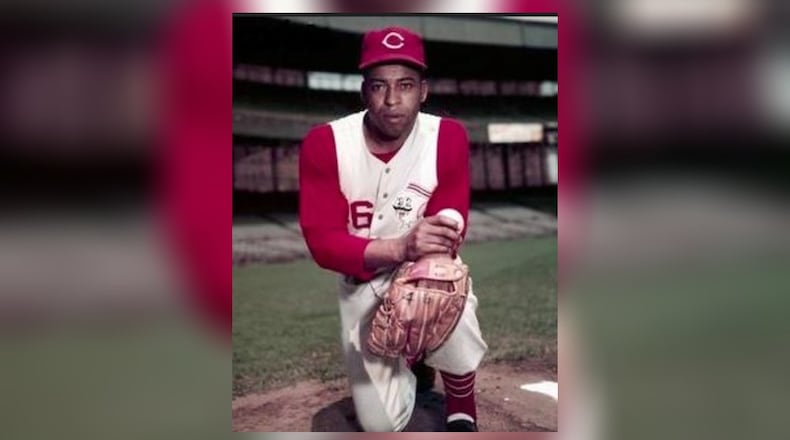“Brooks Lawrence was a remarkable man with a remarkable story,” said Cheryl Lyons, Lawrence’s niece, who wrote the book “Pitching the Dream” about Lawrence.
“His story, of his family and his youth, college years, and service during World War II, features his ongoing love of the game of baseball. The difficulties and adversities he confronted as an African American in both the minor and major leagues and how he overcame them make his ultimate triumph as a Cincinnati Reds Hall of Famer an inspiring story.”
Deena Chisolm, Lawrence’s granddaughter, said he was a mentor and motivator.
“His favorite story to tell was about how long it took him to teach me to ride a tricycle and how happy he was when I finally got it. He thought I could achieve anything I put my mind to and he made me believe it, too,” she said. “He brought that same energy to players he coached and mentored, from collegians to Hall of Fame players.”
Not only was he in the major leagues, Lyons said, but in his youth he was a track star, a basketball, football and baseball player, and he became an avid golfer as an adult.
Although Lawrence was Springfield High School’s first Black quarterback when he was a junior, he never played high school baseball because the team was segregated, Lyons said.
She said Lawrence decided to take a stand one day after watching the team practice and challenged them to an exhibition game. His team made up of friends won 15-2, but he still never got to play high school baseball.
Lawrence graduated high school in 1943, was drafted for World War II and was sent to Guam as part of a segregated Army Engineers unit. He was discharged in 1945.
He then enrolled at Miami University in Oxford in 1947 and was the first Black baseball player at the college. He was signed by the St. Louis Cardinals and assigned to the Triple-A Columbus Red Birds, where he and another teammate broke the Red Birds' color barrier.
Lawrence made his major league debut in 1954 by becoming the Cardinals' first Black pitcher to record a win and the third Black player in the franchise’s history overall.
Lyons said she was only a toddler when Lawrence played in the major leagues, so she only saw him pitch “in the old timers’ baseball games.”
“He was very humble and loving. He was a perfect gentleman,” she said. “As I became much older, I valued the time being around him. He was universal and very insightful.”
Lawrence was then traded to the Reds before the 1956 season and named to the 1956 National League All-Star team after beginning the season with a Reds’ franchise record of 13 straight wins. He later became the Reds’ first Black front office executive in 1972, the first Black player inducted into the Cincinnati Reds Hall of Fame in 1976, and he added an induction into the Ohio Baseball Hall of Fame in 1988.
Chisolm said her grandfather was not only an exceptional athlete, a decorated soldier, a collegiate athletics trailblazer, a coach, a mentor, an integrator, and a philanthropist, but also a loving husband, father and grandfather.
“I am proud to be a part of sharing his story. His path was not easy and, were it not for the barriers of the time, his name would likely be included with the better known greats. Despite those challenges, he made the most of every opportunity and gave back along the way,” she said.
Lawrence ended his pitching career in 1960 with 275 games and a 69-62 record, and later became the first Black head baseball coach at Wilmington College from 1988-93. He died on April 27, 2000, in Springfield.
“Two of Brooks’ proudest engagements in his later years were serving as the coach of the Wilmington College Quakers baseball team between 1987 and 1993. He was named to the Wilmington College Hall of Fame in 2005 and organizing the ‘Teeing it Up for BAT’ Baseball Assistance Team golf outing hosted by Ken Griffey Sr. and Jr. in the early 1990s. This event raised funds to ‘confidentially help members of the Baseball Family who were in need of assistance with nowhere else to turn,’” Chisolm said.
The Conscious Connect CDC was approved for its second Ohio Historical Marker to celebrate Lawrence, according to Karlos L. Marshall, co-founder and co-executive director of The Conscious Connect Community Development Corporation.
He said they are also working with a few baseball teams, including the Reds, on ways to honor Lawrence next season, and have made contact with Wilmington College and plan to contact the St. Louis Cardinals.
“I have been researching notable Black historical figures across the Greater Miami Valley that are worthy of an Ohio Historical Marker and Lawrence certainly fits the bill,” he said.
The state approved the maker, but the text is still being finalized with the Ohio History Connection. It will be located at The Dome, but Marshall said the exact location on the grounds or a date of when it will be ready has not yet been identified.
About the Author



